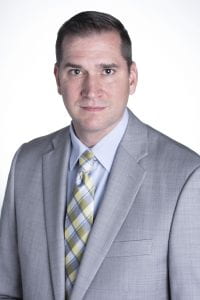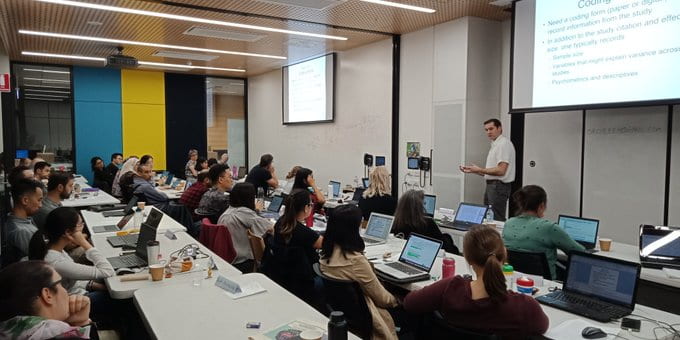
Ernest O’Boyle is the Dale. M. Coleman Chair of Management and an associate professor in the Management and Entrepreneurship Department, teaching Leading Organizations, Leadership and People Management, and co-teaching Designing High-Performance Organizations.
What is the most rewarding aspect of your job?
Seeing course concepts applied to someone’s career. I love that in Kelley Direct, students are often working full-time jobs and can experiment with the course content in their daily lives. It is immensely rewarding when I hear someone tell me, “Hey, I integrated best practices in brainstorming, and it worked great” or “Using the materials on conflict resolution, my boss and I were finally able to get on the same page about my career.” An MBA is an applied degree, so watching what are oftentimes already capable managers learn and grow into top leaders is the best part of my job.
What can students expect from your Kelley Direct courses?
Students will learn the hard science behind soft skills. There is an immense amount of information and misinformation out there and leaders often find themselves so overwhelmed with diluted, impractical, conflicting, and sometimes downright wrong recommendations, that they throw their hands up and just try to go it alone. Although a completely understandable sentiment, there is a better way. In my class, students can expect to first learn what an evidence-based claim actually is, and how to sift through that which is scientifically sound from that which is just some consultant, popular press book, TED talk, etc. trying to sell you something. So, if you want to learn how to run a virtual meeting, how to motivate stars and black holes, or what qualities and strategies the best leaders possess and employ, then my classes will present the most relevant, timely, and accurate evidence as it pertains to those topics.
How has COVID pushed you to teach in new ways?
The pandemic is a tragedy on a global scale, but it has not altered my teaching approach or pedagogy one bit. The reason is that Kelley Direct is perfectly suited and was specifically designed to be an immersive, distance education experience decades before it became a necessity. We are consistently ranked one of the top, if not the top, online MBA programs in the world. We know how to do this right and are constantly finding new ways to evolve to become even better. While other programs scramble to overhaul their “sage on the stage” approach to an exclusively online environment, we’re fine-tuning our existing and successful model.
How do you find work-life balance? What do you tell your students how best to manage their time to be successful?
If it’s not scheduled, it doesn’t happen. Therefore, I block off time for work and non-work activities, and non-activities. What I mean by non-activities are things like “no checking of email,” “no work ruminating,” and “one screen only” (i.e., if TV is on, laptop, phone, and tablet are off). What I try to convey to my students is to avoid the four-burner strategy. If you’ve ever cooked on an old gas stove, then you know that if you turn on all four burners at once, you get medium heat from all of them. However, if you turn off one burner, the other burners increase their heat. Turn off two, more heat off the remaining burners, turn off three, etc. Your life is composed of your health, your family, your friends, and your job. Those are your four burners. The four-burner strategy is that if you want to get good at your job, turn off one of your other burners, and if you want to be the best at your job, turn off all but the work burner. This strategy, although often employed, is unsustainable and not enjoyable. The rationale that “one day I’ll get healthy and spend more time with friends and family, but right now I need to focus on this project, this promotion, or this whatever” just doesn’t work and eventually all four burners go out. One of the top reasons CEOs and senior leaders seek out executive coaching is that they’re looking around at a family they don’t know, a contact list composed exclusively of employees and colleagues, and a lifestyle that isn’t going to take them a day past retirement. The time to establish a work-life balance is now. I want students to forge the habits that achieve this at any stage of their career.
How do you keep students engaged in an online classroom?
I treat them like the working professionals they are and I respect their time. This manifests in several ways. First, traditional teaching where students show up to a class and the professor spends the majority of time lecturing just doesn’t work in an online classroom. You can’t expect students to stay engaged while staring at a professor spout off for 75 minutes. So any content that is one-way communication such as introducing a new leadership theory isn’t taught in a live session. Rather, I’ll make a short 5-minute video that they can watch on their own time. They watch these videos, read articles, complete cases, and simulations all before they attend class. Then, the live sessions are their opportunity to interact and I try to speak as little as possible. When I do speak, it’s only to pose questions about how they might apply the course content to their careers. They’ll be working in breakout rooms, interacting with their peers, and sharing thoughts and implementation strategies. Second and relatedly, students will stay engaged as long as they see value in the material. This means that I need to constantly update the course to make sure that the material is relevant and actionable. Third, KD offers a lot of opportunities for students to interact, but it also offers a lot of opportunities for faculty to interact. I learn best practices in teaching by interacting with Will Geoghegan, Ray Luther, Cristiano Guarana, etc. We have some of the best teachers in the world working in KD, and I’m constantly tapping these individuals to ask what works to maintain and enhance engagement.
What do you tell your students if/when they ask about accelerating their career?
First, I want to know why. If it’s because they think they will finally be happy or finally be able to find that work-life balance, then we need to have a different conversation than the one about career trajectory. Second, I want to know how they define acceleration. Is it just to move up because that’s how they, or their friends, or their parents define success? If so, then accelerating the career is just upgrading the hamster wheel. However, if accelerating their career is motivated by their desire to improve the working conditions for themselves and others, gaining more autonomy, finding more value in their work, or a myriad of other reasons that are about growth, sustainability, and passion, then we can have the career trajectory talk. My job then is to ask questions, not give advice. I’ll ask about their current situation, short- and long-term goals, underlying causes, patterns of behavior, and what strategies they think might break or reinforce those patterns. This doesn’t occur over a single session. This should be an iterative process of experimenting, tracking progress, and adjusting goals and outcomes to better match the adjusting desires of the student. For example, it is relatively common for a student (or really anybody including long-winded professors) to achieve some long sought-after goal only to find out they were following the script that someone else wrote, and what they really wanted was entirely different.
What is something people may not understand about online learning?
Online learning takes active participation. Most Kelley Direct students are very successful in traditional learning environments. They are able to listen to a professor, read an article, and pass a test. What students need to know about our program is that we expect a lot more from you. You are going to need to think, not just remember. For example, in case analysis, I’m not interested in having my own slide deck or readings regurgitated back to me. What I want to see is that the student took the abstract and high-level concepts presented in the course and then applied them thoroughly, accurately, and thoughtfully to a specific instance outlined in the case. By doing this, the student begins to learn how to apply the course content to their own lives. They are able to anticipate their own cognitions, others’ likely reactions, and probabilities of success.
What is something most people don’t know about you?
I study evil. My research focuses on Machiavellians, narcissists, psychopaths, deviant team norms, counterproductive work behaviors, abusive supervision, discrimination, and questionable research practices (i.e., researchers cooking their data). I worked in prisons for a number of years and learning how individuals, groups, organizations, and entire societies can foster the very best and very worst from people fascinates me.
Your book recommendation for MBAs?
It’s entirely dependent on what the student is seeking to learn. So, for example, if you want to know about organizational culture and best practices in HR, then Work Rules! by Laszlo Bock (head of HR at Google) is a great read that is deeply rooted in the empirical literature. If you want to learn about silly, contradictory, and unfounded business claims and how to spot them in the future, then study the content and approaches taken in Hard facts, dangerous half-truths, and total nonsense by Pfeffer and Sutton.
What I’d like to stress is that popular press books have three approaches. The first is evidence by anecdote. Some CEO, entrepreneur, or biographer reflects on his or her life and tries to offer wisdom and advice from it. These are often great reads, and some valuable material can be gleaned. For example, I loved Bad Blood: Secrets and Lies in a Silicon Valley Startup because it did such a good job outlining how unrealistic goals, a charismatic leader, groupthink, and a shaky ethical foundation brought down Theranos. However, I’m always wary of a sample size of one. The second type of book is selective evidence. These books draw on scientific evidence and empirical studies, but they are showing evidence that supports their contentions. These authors put themselves into the role of lawyers (not scientists) and they are trying to persuade you to accept something. This is fine, but this sometimes distorts the truth by presenting the exception as the rule. For example, the truth is that very few people can master something in 10,000 hours. However, if you only focus on those individuals with near-supernatural innate talent and plentiful resources, then, yes, after 10,000 hours of practice, they’ve mastered it or come close to it. However, for most of us, that Peloton bike we got for our birthday isn’t the first step to wearing the yellow jersey at the Tour de France. What I want in a book is for it to tell me the usual outcome, and then tell me what are the circumstances that surrounded the unusual. This is why I gravitate towards the last type of book, which is the one that systematically approaches and reviews the scientific study of business and organizational behavior and then tentatively draws conclusions from this unbiased assessment. These aren’t page-turners and you probably won’t have heard of the author before, but it’s where the best advice is.
